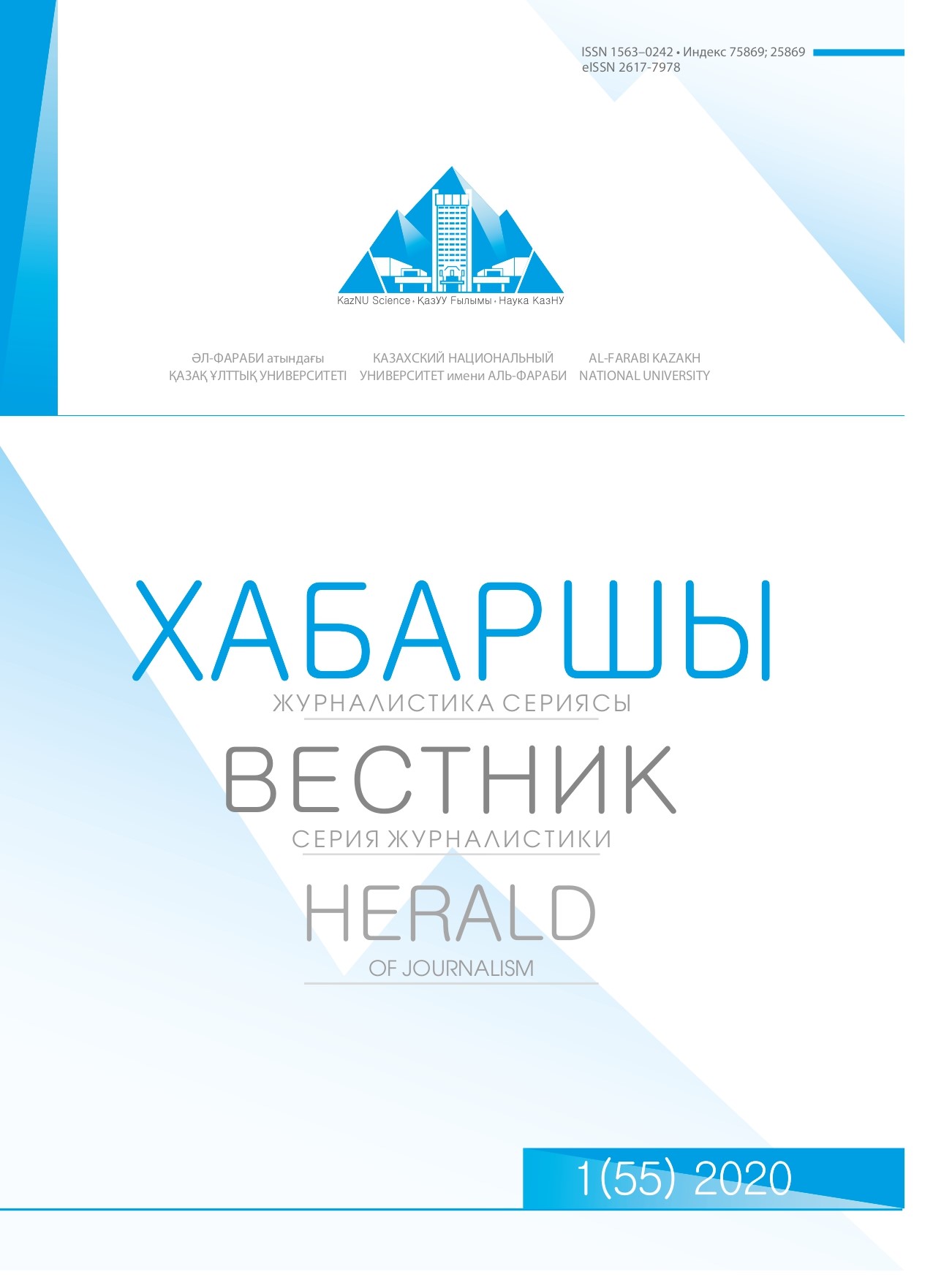Медийная грамотность и проверка фактов: часть вторая
DOI:
https://doi.org/10.26577/HJ.2020.v55.i1.01Ключевые слова:
медийная грамотность, фактчекинг, манипуляция, пропаганда, дезинформация.Аннотация
В данном выпуске публикуется вторая часть исследования автора из Мичиганского университета, посвященного проблемам идентификации и описания дезинформационного кризиса в СМИ и социальных медиа. Термин «фейковые новости» сегодня включает в себя широкий спектр манипулятивных технологий: «вычислительную пропаганду», «марионеточные сети», «армии троллей», анонимный источник, альтернативный факт, сплетни, обман, слухи, ложный контекст и др. Современное медиаполе все больше заполняется недостоверной информацией. Проблемы усугубляется высокими темпами развития технологических процессов и смещением глобального коммуникационного дискурса в социальные сети и интернет.
Цель статьи – изучить историю и эволюцию дезинформационного кризиса, представляющего серьезную угрозу открытым обществам по всему миру. Автор предлагает активизировать критическое мышление у молодежи, научить аудиторию интеллектуально распознавать и обрабатывать фальшивые новости, понимать необходимость критичного и независимого анализа поступающих новостей и фоновой информации.
Автор исследования считает, что медийная грамотность способствует пониманию роли СМИ в обществе, приобретению важных навыков исследования и самовыражения, необходимых аудитории. Навыки медиаграмотности также включают способность получать доступ к медиа, анализировать контент, оценивать сообщения и создавать медиа для общения и самовыражения. Обучение тому, как проверять факты, является важным компонентом обучения медиаграмотности, способом защиты от манипуляций и фальшивых новостей.
Библиографические ссылки
International Center for Journalists. Available at https://ijnet.org/en/story/why-ethical-journalism-matters-newsrooms- and-their-audiences?utm_source=This+week+in+IJNet+-+English&utm_campaign=5342100825-EMAIL_ CAMPAIGN_2018_12_10_02_23&utm_medium=email&utm_term=0_d71e0ded42-5342100825-15059405
Balgaonkar, & Jare, R. (2018). ‘Impact of Social Media on Civic Engagement of Youth’. International Journal of Creative Research Thoughts, 8 (2).
Bordac, W. E. (2014). ‘Introduction to Media Literacy History’. Journal of Media Literacy Education, 6 (1): 1-2.
Bukovsky, V. Newberry Library. Available at http://newberrylibrary.tumblr.com/post/46957606597/i-myself-create-it-edit-it-censor-it-publish Center for Media Literacy. Available at http://www.medialit.org/
Center for Media Literacy. ‘Basic Framework’. Available at http://www.medialit.org/cmls-basic-framework Center for Media Literacy. ‘Five Key Questions Form Foundation for Media Inquiry’. Available at http://www.medialit.org/reading-room/five-key-questions-form-foundation-media-inquiry
Demas, S. J. (2015). ‘The media can’t surrender to a fact-free presidential race’. MLive.
Available at https://www.mlive.com/opinion/index.ssf/2015/11/fact_check_trump_media_bias.html Edelman (2018). ‘2018 Edelman Trust Barometer’, Available at https://www.edelman.com/trust-barometer Edelman (2018). ‘Edelman Trust Barometer 2018: UK Findings’. Available at https://www.edelman.co.uk/magazine/posts/edelman-trust-barometer-2018/
Factcheck.kz. ‘About project’. Available at https://factcheck.kz/en/about-project/ Factcheck.kz (2017). ‘No Discrimiantion in Women Labour Compensation in Kazakhstan’.
Available at https://factcheck.kz/en/glavnoe/false-no-discrimination-in-women-labour-compensation-in-kazakhstan/ Fedorov, A. (2008). ‘Media Education around the World: A Brief History’. Acta Didactica
Napocensia. Available at http://dppd.ubbcluj.ro/adn/article_1_2_7.pdf
Funke, D., & Mantzarlis, A. (2018). ‘Here’s What to Expect from Fact-Checking in 2010’.
Poynter Institute. Available at https://www.poynter.org/fact-checking/2018/heres-what-to-expect-from-fact-checking-in-2019/ Freberg, K., & Kim, C. M. (2018). ‘Social Media Education: Industry Leader Recommendations for Curriculum and Faculty
Competencies. Journalism & Mass Communication Educator, 73 (4): 379-391.
Holan, A. D. (2016). ‘2016 Lie of the Year: Fake News’. PolitiFact. Available at https://www.politifact.com/truth-o-meter/article/2016/dec/13/2016-lie-year-fake-news/ Hwang, T. (2018). ‘The Future of the Deepfake — and What It Means for Fact-checkers’.
Poynter Institute. Available at https://www.poynter.org/fact-checking/2018/the-future-of-the-deepfake-and-what-it-means-for- fact-checkers/
Freedom House (2018). Freedom on the Net 2018. Available at https://freedomhouse.org/report/freedom-net/freedom-net-2018/rise-digital-authoritarianism
Freedom House (2018). Nations in Transit. Available at https://freedomhouse.org/report/nations-transit/2018/Kazakhstan Ibold, H. (2010). ‘Disjuncture 2.0: Youth, Internet Use and Cultural Identity in Bishkek’. Central Asian Survey, 29 (4): 521-535. Jolls, T. (2011). ‘Voices of Media Literacy: International Pioneers Speak: Robyn Quin Interview
Transcript’. Center for Media Literacy. Available at http://www.medialit.org/reading-room/voices-media-literacy-international- pioneers-speak-robyn-quin-interview-transcript
Knight Foundation (2018). ‘Indicators of News Media Trust’. Available at https://knightfoundation.org/reports/indicators-of-news-media-trust
Kumenov, A. (2018). ‘With Media Weak, Online Mischief-makers Run Amok’ EurasiaNet.org. Available at https://eurasianet.org/kazakhstan-with-media-weak-online-mischief-makers-run-amok Kutidze, D. (2018). Interview with E. Freedman in Tbilisi, Republic of Georgia.
Lund University Department of Communication and Media. ‘Media History’. Available at https://www.kom.lu.se/en/education/mediehistoria
Mourão, R. R. & Robertson, C. T. (2019). ‘Fake News as Centrifugal Diversification: A Content Analysis of Sites that Publish False, Misleading, Hyperpartisan and Sensational
Information’. Journalism Studies.
Morganthaler, D. (2010). ‘Voices of Media Literacy: International Pioneers Speak: Cary
Bazalgette Interview Transcript’. Center for Media Literacy. Available at http://www.medialit.org/reading-room/voices-media- literacy-international-pioneers-speak-cary-bazalgette-interview-transcript
Nikolayenko, O. (2015). ‘Youth Media Consumption and Perceptions of Electoral Integrity in Kazakhstan and Kyrgyzstan.’ Demokratizatsiya, 23 (3): 257-276.
Oeldorf-Hirsch, A., & Srinivasan, P. (2018). ‘News Finds Them and Then What? How Post- Millennials Engage with Social and Mobile Media News’. Paper presented to the Association for Education in Journalism & Mass Communication.
O’Grady, S. (2018). ‘In Cameroon, Journalists Are Being Jailed on Charges of “Fake News’.
Washington Post. Available at https://www.washingtonpost.com/world/africa/in-cameroon-journalists-are-being-jailed-on- charges-of-fake-news/2018/12/15/80bcb5c6-f9ad-11e8-8642-c9718a256cbd_story.html?utm_term=.fefe23811eec
Posetti, J. & Matthews, A. (2018). A Short Guide to the History of ‘Fake News’ and
Misinformation. International Center for Journalists. Available at https://www.icfj.org/sites/default/files/2018-07/A%20 Short%20Guide%20to%20History%20of%20Fake%20News%20and%20Disinformation_ICFJ%20Final.pdf
Shugyla, S., Nassimova, G. & Massalimova, A. (2017). ‘The Kazakhstani Youth’s Engagement in Politics’. Studies of Transition States and Societies, 9 (1): 53-71.
Tamboer, S. L. (2018). ‘”We Are a New Generation”: Early Adolescents’ Views on News and
News Literacy’. Paper presented to the Association for Education in Journalism & Mass Communication. UNESCO (2018). Journalism, ‘Fake News’ and Disinformation: Handbook for Journalism
Education and Training. Available at https://en.unesco.org/fightfakenews
U.S. Department of Justice (2018, 16 February). U.S. vs. Internet Research Agency LLC et al.
Indictment. U.S. District Court for the District of Columbia. Available at https://www.justice.gov/file/1035477/download Wesleyan University. ‘Information Literacy’. Available at
https://www.wesleyan.edu/libr/infoforyou/infolitdefined.html Zhang, W. (2013). ‘Redefining Youth Activism through Digital Technology in Singapore’.
International Communication Gazette, 75 (3): 253-270.













